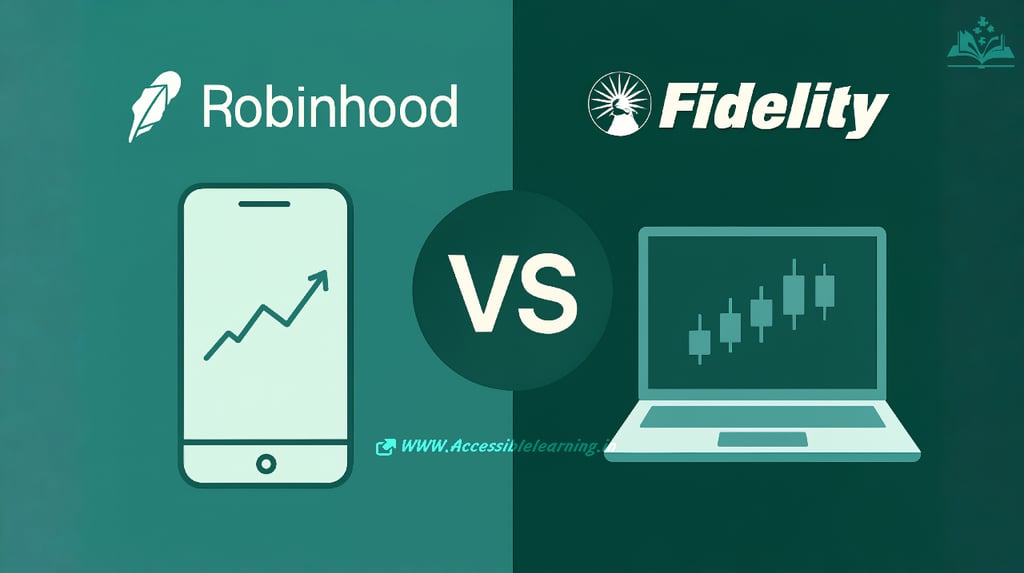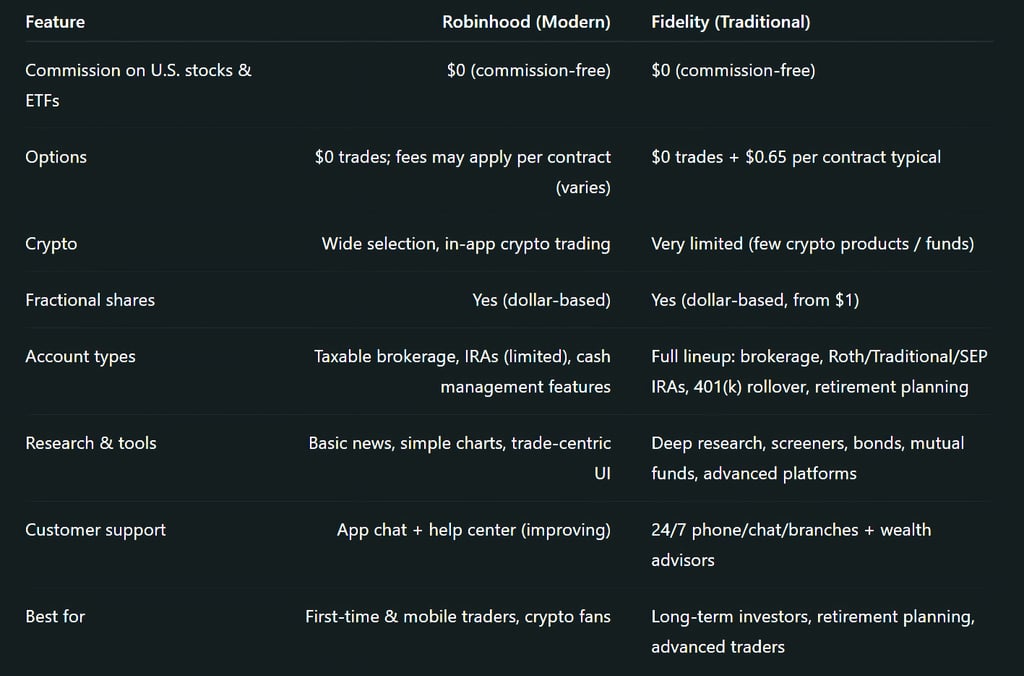
Robinhood vs Fidelity — Modern vs Traditional Brokers Compared
A comprehensive 2025 comparison of Robinhood and Fidelity, highlighting fees, features, tools, and investor needs. Explore the strengths of modern mobile-first trading vs traditional full-service brokerage to find the best fit for your investment style.
STOCK MARKETSTOCK OPERATORBANKING/CASH-FLOWCOMPANY/INDUSTRY
Keshav Jha
8/13/20255 min read


Robinhood = mobile-first, simple, low-friction trading (stocks, ETFs, options, crypto), popular with beginners and active app traders. Commission-free on stocks/ETFs/options; broad crypto selection.
Fidelity = full-service, research-rich traditional brokerage with advanced platforms, retirement accounts, and extensive investment choices; it is also commission-free for stocks/ETFs (an options per-contract fee applies). Strong customer service and lower margin rates for larger balances.
Costs & fees — “free” isn’t the whole story
Both brokers market commission-free trading on U.S. stocks and ETFs, but the real costs differ in execution, add-ons, and peripheral fees.
Robinhood: $0 commission for stocks/ETFs/options; offers paid tier (Robinhood Gold) for margin and research. Crypto trading is commission-free, but spreads/crypto-specific fees apply.
Fidelity: $0 commission for U.S. stocks/ETFs; options trades usually have a $0.65 per-contract fee. Fidelity’s margin rates are among the industry’s more competitive offerings, and it provides a wide range of fee-free mutual funds and bonds.
Takeaway: If you trade basic stocks/ETFs, both are cheap. If you trade options intensively, buy bonds, or need low margin costs, Fidelity’s pricing structure can win out.
Tradable assets & product depth
Robinhood: Stocks, ETFs, options, and a consumer-facing crypto marketplace with many coins and fractional crypto trades.
Fidelity: Wide asset universe—stocks, ETFs, mutual funds (including zero-expense index funds), bonds, CDs, managed accounts, and retirement products. Crypto access is much more limited at the retail level.
Human note: If your portfolio includes bonds, mutual funds, or retirement rollovers, Fidelity is more likely to have what you need in a single place.
Trading tools, research & educational support
Robinhood: Clean, mobile-first UI that removes friction. Tools are trade-focused (simple charts, watchlists, and market news). Recent expansions aim to add wealth features and AI help, but depth is lighter compared with legacy brokers.
Fidelity: Multiple platforms (web, Active Trader Pro), advanced screeners, in-depth analyst reports, bond search tools, retirement calculators, and human advisors. Better suited for those who want to research, plan, and execute complex strategies.
Takeaway: For learning and long-term planning, Fidelity has the richer toolkit. For low-friction, on-the-go trading, Robinhood’s UX leads.
App experience & mobile UX
Robinhood built its brand on a frictionless mobile experience: quick sign-up, gamified touches, and simple order flows. Fidelity’s mobile apps are feature-rich (portfolio views, research, account services) and cater to both casual users and power users, albeit with a steeper learning curve. Here it’s simplicity vs control.
Customer service, safety & trust
Fidelity: Longstanding reputation, broad customer support (phone, chat, branches), and regulated wealth-management services. SIPC protection for brokerage assets with additional coverage for eligible accounts.
Robinhood: Popular with younger investors and improving in support, though historically faced criticism over outages and regulatory issues. SIPC-protected for securities and steadily enhancing trust factors.
Practical tip: For large, complex portfolios or if you value human advisors and in-person help, Fidelity’s support network is more mature.
Advanced features—margin, managed accounts, retirement
Robinhood: Offers margin and limited managed account features via premium tiers, plus banking-like services.
Fidelity: Robust margin lending, comprehensive managed portfolios (Fidelity Go and wealth management), deep retirement support, and tax-efficient investing tools.


Customer service, safety & trust
Fidelity: Longstanding reputation, broad customer support (phone, chat, branches), and regulated wealth-management services. SIPC protection for brokerage assets with additional coverage for eligible accounts.
Robinhood: Popular with younger investors and improving in support, though historically faced criticism over outages and regulatory issues. SIPC-protected for securities and steadily enhancing trust factors.
Practical tip: For large, complex portfolios or if you value human advisors and in-person help, Fidelity’s support network is more mature.
Advanced features—margin, managed accounts, retirement
Robinhood: Offers margin and limited managed account features via premium tiers, plus banking-like services.
Fidelity: Robust margin lending, comprehensive managed portfolios (Fidelity Go and wealth management), deep retirement support, and tax-efficient investing tools.
Who should choose which?
Choose Robinhood if:
You want a super simple, mobile-first app for quick trades.
You trade frequently in small amounts (fractional shares, crypto).
You prioritize UX simplicity over deep research tools.
Choose Fidelity if:
You’re focused on long-term investing, retirement, or tax-efficient accounts.
You want deep research, bond markets, mutual funds, and human advisors.
You prefer predictable per-contract options fees and competitive margin rates.

Order execution quality
While both claim best execution practices, traditional brokers like Fidelity often publish detailed execution quality reports, showing price improvement percentages. This can impact your costs subtly, especially for large orders. Robinhood also reports execution stats, but if you’re trading in higher volumes or in volatile markets, Fidelity’s deeper routing options could provide better fills.
Tip: If you place large trades, ask the broker for their latest “Rule 605” execution report—it’s a public record in the U.S.
Cash sweep & idle cash interest
Brokers earn interest on your uninvested cash. Fidelity offers automatic cash sweeps into interest-bearing accounts or money market funds, often with competitive yields. Robinhood offers interest on uninvested cash through Robinhood Gold, but only for premium subscribers.
Tip: If you tend to leave cash sitting in your account, calculate the annual interest you’d earn—it can be a hidden value booster.
Tax management tools
For active traders, tax lot selection (FIFO, LIFO, specific ID) can help reduce capital gains taxes. Fidelity offers full control over tax lot selection, while Robinhood uses default methods without much customization.
Tip: Even if you’re a beginner, learn about “specific lot” sales—it can save you real money in taxable accounts.
Extended trading hours
Robinhood offers extended hours and even some 24-hour trading for select securities. Fidelity provides pre-market and after-hours trading, though the hours are slightly shorter compared to Robinhood’s expanded offerings.
Tip: Extended hours can be useful for reacting to earnings reports—but be aware of lower liquidity and wider spreads.
Security & account protection layers
Both offer SIPC coverage, but the extra security protocols differ. Fidelity has long offered free two-factor authentication via security tokens and app-based verification. Robinhood has strengthened its account security with device-based authentication and crypto-specific protections.
Tip: Always enable 2FA and avoid logging in from unsecured public networks—even if your broker already has good security.
Social and community features
Robinhood leans into social trends—adding in-app news feeds and market mood tracking. Fidelity focuses more on professional research rather than community trading sentiment.
Tip: If you like crowd sentiment for short-term trading, Robinhood may feel more “alive.” If you prefer unbiased analyst data, Fidelity is better.
FAQ
Q: Are trades free on both platforms?
For U.S. stocks and ETFs, both offer $0 commission trades as of Aug 8, 2025. Options and other product fees vary.
Q: Which has better crypto support?
Robinhood—broader selection and in-app crypto trading. Fidelity offers limited crypto access.
Q: Can I do retirement accounts on Robinhood?
Robinhood offers limited IRA options; Fidelity offers a full suite of IRAs and retirement tools.
Q: Which is safer?
Both are regulated and provide SIPC protection for securities. Fidelity’s history and advisor network give it an edge for complex needs
Robinhood = Modern broker: outstanding UX, democratized access, strong for micro-investing, crypto, and mobile traders. Great entry point.
Fidelity = Traditional broker: comprehensive services, deep research, retirement-focused products, and advisor access—better for long-term planning and serious investors.
If you’re building a long, diversified financial life that includes retirement planning, bonds, mutual funds, and advice—Fidelity is the better fit. If your goal is simple, low-friction trading, experimenting with crypto, or quick fractional investing—Robinhood delivers the modern, streamlined experience.
Subscribe To Our Newsletter
All © Copyright reserved by Accessible-Learning Hub
| Terms & Conditions
Knowledge is power. Learn with Us. 📚


